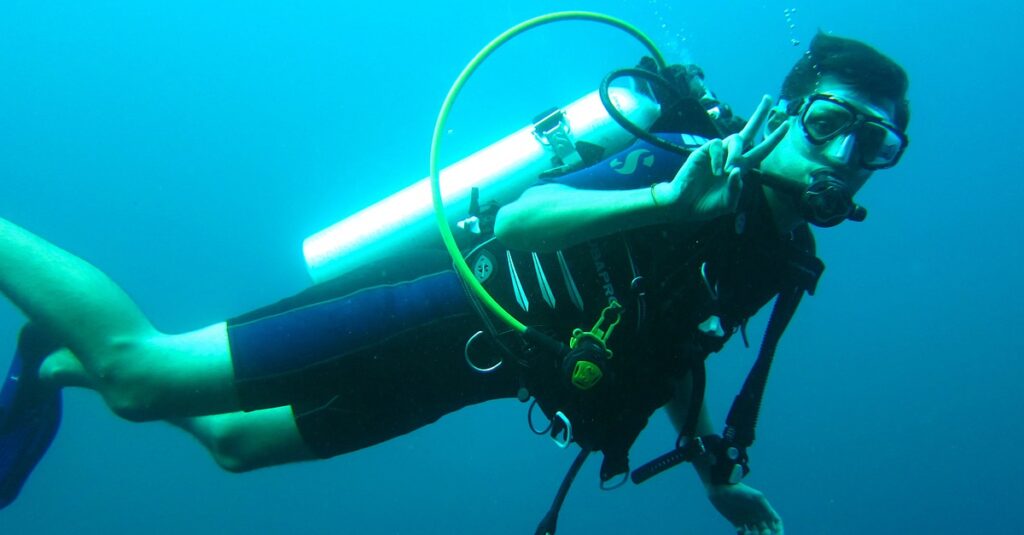

There’s no doubt that any underwater activity requires a unique approach to breathing, but scuba diving ups the challenge while offering aid.
Scuba divers often have stronger lungs than those that do not dive. It’s more likely that this comes from the exercises they perform to improve efficiency while underwater, not because of regular diving.
Scuba diving strengthens lungs by proxy, but you need to be doing the right tasks to unlock that benefit. Keep reading as we explore the effect of scuba diving on the lungs, including potential risks.
Does Scuba Diving Strengthen Your Lungs?
If you dive regularly you are bound to notice a difference in how you breathe and how efficiently you breathe. Scuba diving changes how you approach breathing as you focus on getting more out of your limited supply of air.
Mid-dive is not the right time to work on strengthening your lungs, and waiting until then to do so can cause harmful instincts to take over, including hyperventilation.
It’s more effective to work on strengthening the lungs out of water, then put these exercises to practice during a dive. Any strengthening you witness from diving is more likely a by-product of proper conditioning.
How Scuba Divers Strengthen Their Lungs
Scuba divers focus on breathing as much oxygen into their blood as possible, and they use a few different techniques to do so.
Diaphragmatic breathing draws the air into the most efficient part of the lungs. This means that divers don’t need to inhale as much air to transfer a viable amount of oxygen, and it also slows the heart rate and helps them relax.
Divers also strengthen their lungs through muscle memory. This prevents harmful reflexes from taking over and leading to inefficient breathing. Practicing deep diaphragmatic breaths out of the water makes them more achievable when attached to an oxygen tank.
Segmented breathing, which is common with yoga, also helps divers strengthen their lungs through inhaling and exhaling in smaller segments. This is more similar to breathing while scuba diving than the automatic continuous breaths you take on land.
Does Scuba Diving Affect Lungs?
Scuba diving affects the lungs in both positive and negative ways.
Your lungs become stiffer as you dive because of your body redistributing blood to the area. This makes it more difficult to breathe, especially as you descend further and decrease the volume of air in your lungs.
The fitness requirement of scuba diving is a great way to encourage individuals to train their body to handle oxygen more efficiently. Those that take it seriously are likely to feel the benefits of improved lung function on land, and stronger lungs assist in regular exercise and remaining calm.
Despite this overarching benefit of scuba diving on lung health, there are several specific concerns to note.
Scuba Related Risks for Lungs
Scuba diving poses a threat to lung health in many ways.
- Barotrauma: As you ascend, the water pressure decreases and the air in your lungs expands, and the air sacs in your lungs may rupture and make it harder to breathe.
- Decompression Sickness: If you ascend too quickly, the nitrogen bubbles in your body’s tissues may not exit safely through your lungs.
- Lung Collapse: Occurs when air blister blebs break open and send air into the space surrounding the lung.
These issues and others related to lung function are best avoided by staying in fit condition and following proper diving procedure when descending and ascending.
Do Scuba Divers Have Bigger Lungs?
This 1999 study supports the idea that divers have bigger lungs, but that does not indicate an increase in performance from diving alone.
Another study notes that larger lungs from diving are more representative of natural selection for diving, meaning that those better suited for diving are more likely to perform the task. It’s also worth noting that habitual diving may lead to small airways disease, which also affects the forced vital capacity (FVC) used to calculate lung size in divers.
Lung size does not directly correlate to performance during a dive, and it’s more important to focus on conditioning to improve the strength of someone’s lungs. Efficient use of oxygen is safer and more effective than pushing more air through your body.
References
https://oem.bmj.com/content/57/6/390
https://pubmed.ncbi.nlm.nih.gov/16002939/
https://www.aafp.org/pubs/afp/issues/2001/0601/p2225.html
https://dan.org/alert-diver/article/your-lungs-and-diving/
https://www.kooxdiving.com/en/how-to-breathe-underwater-while-scuba-diving/
https://myhealth.alberta.ca/Health/Pages/conditions.aspx?hwid=abo0894
